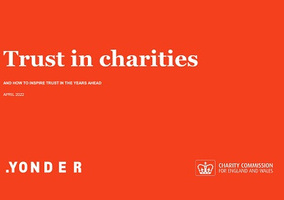Research shows that the general public continues “to have little real knowledge or understanding of the Charity Commission”, with under half having heard of it.
The research was conducted on behalf of the Commission by Yonder, in April 2023, and shows that in the past year there has been a drop in both awareness of and familiarity with the Commission, continuing the trend observed in 2022 of falling recognition.
“Most do tend to assume that the Charity Commission is the ‘watchdog’ for charities, though that is often after having considered the matter due to their involvement in this research and there is seldom a deep understanding of the Commission’s work or role in regulating charities”, it states.
In the 2023 research, 48% of the public had heard of the Commission, dropping from 50% the year before, and 54% in 2021.
The public tends to think the Commission’s focus should be split between dealing with wrongdoing and supporting charities, the latest report says.
“They also hope tolerance is shown when dealing with honest mistakes, particularly with smaller, volunteer-run charities, for which education would be more beneficial than punishment. Larger, professional charities are held to higher standards in this regard, as the public believe they should be more aware of procedures,” it states.
Some 95% of trustees remain confident that the Commission will deal appropriately with wrongdoing and harm once it is identified. They are also more confident than in 2020 that the Commission can uncover wrongdoing in the first instance.
Public trust in charities
The research found there is “stability in the public perception of charities” who are more trusted than they were half a decade ago and more trusted than most other institutions and sectors in public life.
Mean trust of confidence in charities was 6.3 out of 10 compared to 6.2 the year prior. Only doctors were ranked higher in perceived trustworthiness.
“This marks the third year in a row of steady public trust in charities, suggesting that the recovery from the 2015-2020 trust crisis may have reached a plateau that remains below historic highs,” it says.
Those who are less inclined to trust charities stop short of describing them as essential due to existing doubts about stewardship of funds.
The research finds there is a clear preference for trustees to be cautious when spending charity funds, and that volunteer-run, smaller charities have an easier time inspiring trust than larger, international charities.
‘No charity has an innate right to trust’
In a blog, Paul Latham, director of communications and policy at the Commission, wrote “trust in charities is not uniform and remains higher in more diverse and affluent urban communities”.
He added: “Charities have been very visible, including in supporting the most vulnerable, during current cost-of-living challenges, and of course throughout the pandemic. This appears to have been positively recognised, particularly by those who have benefitted from charitable support.”
Latham wrote: “There is much to be positive about from this research – but it’s also clear that there is no room for complacency, for charities, or for us as regulator. We know that trust is hard earned and can very easily be lost – and no charity has an innate right to trust or support from the public.”
Related Articles












